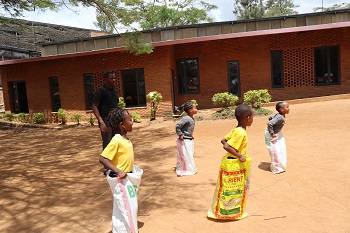Course Introduction
Introduction
 Thank you for joining us on the Ready to Learn: Education for Positive Peace course which has been designed to build a shared understanding of how to support your learners so that they are all Ready to Learn. The course will empower you to understand what Education for Positive Peace (E4PP) looks like in the classroom, school and wider community. A Partner in Education (APIE) has worked in collaboration with Umubano Academy (UA) for several years to place positive peace at the centre of everything we do. APIE and Umubano Academy are continually developing a model of education for positive peace as a whole-school approach to being ready to learn. APIE has also worked closely with Aegis Trust (https:// www.aegistrust.org), learning from their expertise in positive peace education. We are here to share what we are learning about developing the concept of positive peace in schools in Rwanda.
Thank you for joining us on the Ready to Learn: Education for Positive Peace course which has been designed to build a shared understanding of how to support your learners so that they are all Ready to Learn. The course will empower you to understand what Education for Positive Peace (E4PP) looks like in the classroom, school and wider community. A Partner in Education (APIE) has worked in collaboration with Umubano Academy (UA) for several years to place positive peace at the centre of everything we do. APIE and Umubano Academy are continually developing a model of education for positive peace as a whole-school approach to being ready to learn. APIE has also worked closely with Aegis Trust (https:// www.aegistrust.org), learning from their expertise in positive peace education. We are here to share what we are learning about developing the concept of positive peace in schools in Rwanda.
Key Words and Phrases
In each unit of this course you will find definitions of key words and phrases which will support your understanding, and engagement with the strategies, as you work through the content. We hope these will be useful to you!
|
Key Words/Phrases
|
Definitions
|
|---|---|
|
Cohesion
|
Unity, togetherness, collaboration and inclusion.
|
|
Cross-cutting
|
Covered in all subjects, rather than as a separate topic or subject.
|
|
Empathy
|
Being able to put yourself in someone else's shoes to understand how the other person feels.
|
|
'Guide on the side’
|
The teacher is a facilitator of the learning; the teacher empowers and enables the learners to explore what they are learning, while keeping them on the right track. This is the ideal way a teacher should teach learners.
|
|
Peace
|
Calm, harmonious, constructive and free from stress.
|
|
Positive
|
Good, helpful, supportive, encouraging and aiming to achieve the best outcomes.
|
|
Pluralism
|
Different groups living well together.
|
|
‘Sage on the stage’
|
The teacher controls the learning and presents himself or herself as all-knowing and the source of all knowledge in the classroom; the learners are a passive audience watching the teacher ‘performing’ for them. This is not an effective way to teach and is not learner-centred.
|
|
Social
|
Relating to the community, relationships and all of the human interactions in our communities.
|
|
Sustainable
|
Long-lasting; able to continue indefinitely in to the future; never-ending.
|
